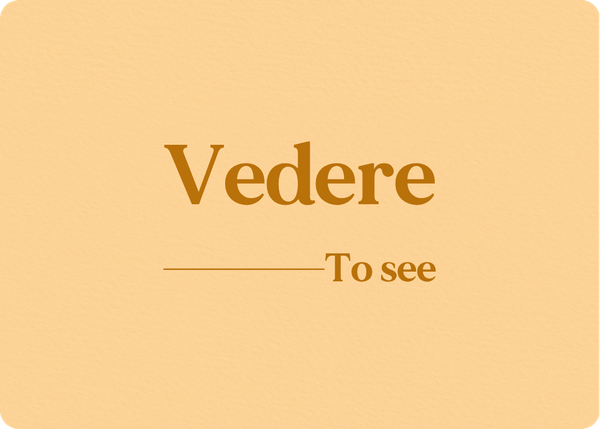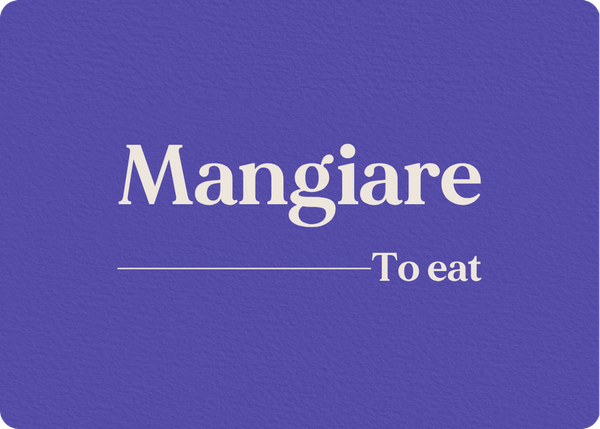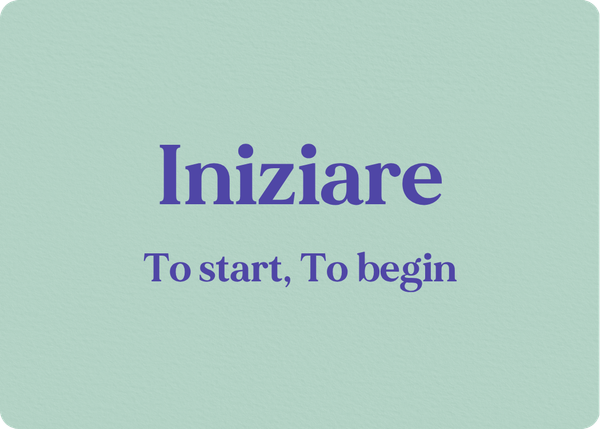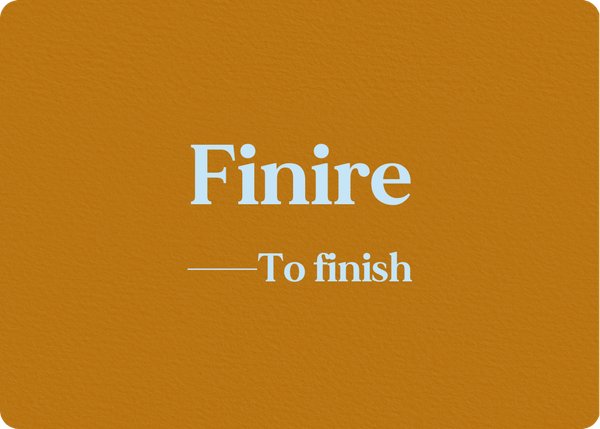What is Vedere?
Vedere is an Italian verb meaning "to see", "to watch", or "to meet". It belongs to the second conjugation (-ERE verbs) and is irregular in some tenses. This verb is useful for everyday Italian conversation, from describing what you see to discussing meetings and expressing perception and understanding.
Key Features of Vedere:
- Type: Irregular second conjugation verb (-ERE)
- Meaning: To see, to watch, to meet, to look at
- Irregularities: Simple past (vidi, etc.), future (vedrò), present conditional (vedrei), past participle (visto)
- Auxiliary verb: Uses "avere" (to have) for conjugation in compound tenses
- Past participle: Visto (most common) or Veduto
Indicativo – Indicative Mood
Presente (Present Tense)
| Person | Conjugation |
|---|---|
| io | vedo |
| tu | vedi |
| lui/lei | vede |
| noi | vediamo |
| voi | vedete |
| loro | vedono |
Example:
Vedo un bellissimo tramonto dalla finestra.
I see a beautiful sunset from the window.
Passato Prossimo (Present Perfect)
| Person | Conjugation |
|---|---|
| io | ho visto |
| tu | hai visto |
| lui/lei | ha visto |
| noi | abbiamo visto |
| voi | avete visto |
| loro | hanno visto |
Example:
Ho visto questo film almeno tre volte.
I’ve seen this movie at least three times.
Imperfetto (Imperfect)
| Person | Conjugation |
|---|---|
| io | vedevo |
| tu | vedevi |
| lui/lei | vedeva |
| noi | vedevamo |
| voi | vedevate |
| loro | vedevano |
Example:
Quando ero piccola, vedevo i miei nonni ogni domenica.
When I was little, I used to see my grandparents every Sunday.
Trapassato Prossimo (Past Perfect)
| Person | Conjugation |
|---|---|
| io | avevo visto |
| tu | avevi visto |
| lui/lei | aveva visto |
| noi | avevamo visto |
| voi | avevate visto |
| loro | avevano visto |
Example:
Non avevamo mai visto una piramide prima d'ora.
We had never seen a pyramid before now.
Passato Remoto (Simple Past)
| Person | Conjugation |
|---|---|
| io | vidi |
| tu | vedesti |
| lui/lei | vide |
| noi | vedemmo |
| voi | vedeste |
| loro | videro |
Example:
Gli esploratori videro terre mai viste prima.
The explorers saw lands never seen before.
Trapassato Remoto (Past Anterior)
| Person | Conjugation |
|---|---|
| io | ebbi visto |
| tu | avesti visto |
| lui/lei | ebbe visto |
| noi | avemmo visto |
| voi | aveste visto |
| loro | ebbero visto |
Example:
Fabrizio non parlò più, dopo che ebbe visto la scena.
Fabrizio stopped speaking after he had seen the scene.
Futuro Semplice (Simple Future)
| Person | Conjugation |
|---|---|
| io | vedrò |
| tu | vedrai |
| lui/lei | vedrà |
| noi | vedremo |
| voi | vedrete |
| loro | vedranno |
Example:
Quando arriverai a Roma, vedrai monumenti meravigliosi.
When you arrive in Rome, you will see wonderful monuments.
Futuro Anteriore (Future Perfect)
| Person | Conjugation |
|---|---|
| io | avrò visto |
| tu | avrai visto |
| lui/lei | avrà visto |
| noi | avremo visto |
| voi | avrete visto |
| loro | avranno visto |
Example:
I bambini saranno felicissimi quando avranno visto il regalo che gli abbiamo comprato.
The kids will be super happy when they see the present we bought them.
Congiuntivo – Subjunctive Mood
Presente (Present Subjunctive)
| Person | Conjugation |
|---|---|
| che io | veda |
| che tu | veda |
| che lui/lei | veda |
| che noi | vediamo |
| che voi | vediate |
| che loro | vedano |
Example:
È probabile che Anna non veda il messaggio subito.
Anna probably won't see the message right away.
Passato (Past Subjunctive)
| Person | Conjugation |
|---|---|
| che io | abbia visto |
| che tu | abbia visto |
| che lui/lei | abbia visto |
| che noi | abbiamo visto |
| che voi | abbiate visto |
| che loro | abbiano visto |
Example:
Penso che Marco abbia visto qualcosa di strano.
I think Marco saw something strange.
Imperfetto (Imperfect Subjunctive)
| Person | Conjugation |
|---|---|
| che io | vedessi |
| che tu | vedessi |
| che lui/lei | vedesse |
| che noi | vedessimo |
| che voi | vedeste |
| che loro | vedessero |
Example:
Non pensavo che lui vedesse le cose in quel modo.
I didn't think that he saw things that way.
Trapassato (Past Perfect Subjunctive)
| Person | Conjugation |
|---|---|
| che io | avessi visto |
| che tu | avessi visto |
| che lui/lei | avesse visto |
| che noi | avessimo visto |
| che voi | aveste visto |
| che loro | avessero visto |
Example:
Se avessi visto la sua faccia, avresti capito che non stava scherzando.
If you’d seen his face, you’d have known he wasn’t joking.
Condizionale – Conditional Mood
Presente (Present Conditional)
| Person | Conjugation |
|---|---|
| io | vedrei |
| tu | vedresti |
| lui/lei | vedrebbe |
| noi | vedremmo |
| voi | vedreste |
| loro | vedrebbero |
Example:
Vedrei volentieri quel documentario.
I would gladly watch that documentary.
Passato (Past Conditional)
| Person | Conjugation |
|---|---|
| io | avrei visto |
| tu | avresti visto |
| lui/lei | avrebbe visto |
| noi | avremmo visto |
| voi | avreste visto |
| loro | avrebbero visto |
Example:
Se io non avessi cambiato strada, mi avresti visto passare.
If I hadn't changed route, you would have seen me pass by.
Imperativo (Imperative)
| Person | Conjugation |
|---|---|
| (tu) | vedi |
| (lui/lei) | veda |
| (noi) | vediamo |
| (voi) | vedete |
| (loro) | vedano |
Example:
Vediamo di finirla qui.
Let's stop this here.
Indefinite Moods
Infinito (Infinitive)
- Presente (Present): vedere (to see)
- Passato (Past): avere visto (to have seen)
Examples:
Spero di vedere presto i risultati di tutti i miei sforzi.
I hope to see the results of all my efforts soon.
Credo di aver(e) visto un cervo nel bosco.
I believe I saw a deer in the forest.
Participio (Participle)
- Presente (Present): vedente (seeing) - commonly used as noun meaning "a person who can see" or adjective meaning "sighted"
- Passato (Past): visto (seen) - most common form - or veduto (seen) - less common
Example:
Quel quadro, visto da vicino, è ancora più bello.
That painting is even more beautiful when seen up close.
Gerundio (Gerund)
- Presente (Present): vedendo (seeing)
- Passato (Past): avendo visto (having seen)
Examples:
Vedendo la foto, ricordò immediatamente quel momento speciale.
Seeing the photo, he immediately remembered that special moment.
Avendo visto le previsioni del tempo, ho portato con me l'ombrello.
Having seen the weather forecast, I brought my umbrella with me.
The verb Vedere at a glance: Key tenses you need
| Present | Present Perfect | Imperfect | Present Subjunctive | Imperfect Subjunctive | Present Conditional |
|---|---|---|---|---|---|
| io vedo | io ho visto | io vedevo | che io veda | che io vedessi | io vedrei |
| tu vedi | tu hai visto | tu vedevi | che tu veda | che tu vedessi | tu vedresti |
| lui/lei vede | lui/lei ha visto | lui/lei vedeva | che lui/lei veda | che lui/lei vedesse | lui/lei vedrebbe |
| noi vediamo | noi abbiamo visto | noi vedevamo | che noi vediamo | che noi vedessimo | noi vedremmo |
| voi vedete | voi avete visto | voi vedevate | che voi vediate | che voi vedeste | voi vedreste |
| loro vedono | loro hanno visto | loro vedevano | che loro vedano | che loro vedessero | loro vedrebbero |
Conclusion
Mastering the conjugation of "vedere" is useful for expressing sight, perception, and meetings in Italian. As an irregular second conjugation verb, it requires attention to its irregular forms, especially in simple past (vidi, etc.) and future/conditional (vedr-).
Remember the key points:
- Uses "avere" as auxiliary verb in compound tenses
- Irregular in certain forms
- Past participle is "visto" (most common) or "veduto" (less common)
- Essential for describing what you see, watch, or perceive
Keep practicing with real sentences and contextual examples to master this Italian verb!





